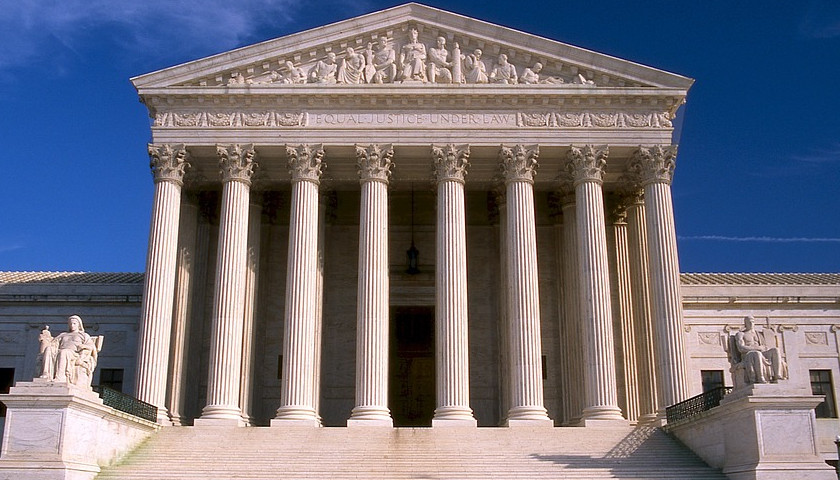by Kevin Daley
The Supreme Court tossed out capital defendant Curtis Flowers’s death sentence Friday, finding that prosecutors unlawfully rigged his jury by excluding African Americans.
Justice Brett Kavanaugh delivered the opinion for a seven-justice majority, which said the prosecution violated the 1986 Batson v. Kentucky decision. Batson provides that peremptory strikes — which allow lawyers to boot prospective jurors for any reason at all — cannot be used to exclude people based on race.
 “The state’s relentless, determined effort to rid the jury of black individuals strongly suggests that the state wanted to try Flowers before a jury with as few black jurors as possible, and ideally before an all-white jury,” Kavanaugh wrote. “The trial judge was aware of the history. But the judge did not sufficiently account for the history when considering Flowers’ Batson claim.”
“The state’s relentless, determined effort to rid the jury of black individuals strongly suggests that the state wanted to try Flowers before a jury with as few black jurors as possible, and ideally before an all-white jury,” Kavanaugh wrote. “The trial judge was aware of the history. But the judge did not sufficiently account for the history when considering Flowers’ Batson claim.”
“In the Dark,” an American Public Media podcast, produced an award-winning series on the Flowers case.
A white prosecutor, Doug Evans, has tried Flowers six times in the Mississippi courts for a 1996 quadruple homicide. Two of those cases resulted in a mistrial due to deadlocked juries. Flowers was found guilty in the other three, but appeals courts lifted those convictions because of misconduct on Evans’s part.
Those appellate courts identified Batson violations — that is, instances in which Evans purposefully excluded black jurors because of their race — in two of those trials. Altogether, Evans used peremptory strikes to kick 41 of the 42 prospective black jurors he could have removed.
Yet discerning Evans’s discriminatory intent proved difficult in some instances, as he had facially legitimate reasons for excluding certain black jurors. The community where the Flowers trials have been conducted is small, and many potential jurors have disqualifying connections to the case. As time has progressed, assembling an impartial panel has become a tall order.
“As the Court takes pains to note, this is a highly unusual case,” Justice Samuel Alito wrote in a short concurring opinion. “Indeed, it is likely one of a kind.”
The sixth and most recent trial, which resulted in a conviction, was the matter before the Supreme Court.
Kavanaugh cited four reasons for throwing out Flowers’s latest conviction: Evans’s record of racially-tinged strikes; the fact Evans booted five of six potential black jurors during the sixth trial; a finding that prosecutors “engaged in dramatically disparate questioning of black and white prospective jurors” in a bid to find legitimate reasons to exclude African American jurors during the sixth trial; and the removal of a potential black juror — ostensibly for bias — who had similar conflicts to white candidates prosecutors did not scrutinize.
“In reaching that conclusion, we break no new legal ground,” Kavanaugh wrote. “We simply enforce and reinforce Batson by applying it to the extraordinary facts of this case.”
Justice Clarence Thomas, who broke with his usual practice and asked questions during the Flowers arguments, filed a dissent which Justice Neil Gorsuch joined. Thomas argued that the Flowers case does not meet the high court’s usual criteria for review. The justices generally hear disputes presenting urgent national issues or questions of law over which multiple courts disagree. They do not take cases simply to reverse mistakes.
“Perhaps the Court granted [review] because the case has received a fair amount of media attention,” Thomas wrote. “But if so, the Court’s action only encourages the litigation and re-litigation of criminal trials in the media, to the potential detriment of all parties — including defendants. The media often seeks ‘to titillate rather than to educate and inform.’”
In another portion of the dissent Gorsuch did not join, Thomas suggested the Batson case was wrongly decided.
“That rule was suspect when it was announced, and I am even less confident of it today,” the justice wrote. Thomas has questioned other landmark precedents this term, including Gideon v. Wainwright (establishing counsel for indigent defendants), The New York Times v. Sullivan (a press freedom case), and Roe v. Wade.
Speaking after Friday’s decision, Flowers attorney Sheri Lynn Johnson urged Mississippi prosecutors to set Flowers free instead of seeking another trial.
“That Mr. Flowers has already endured six trials and more than two decades on death row is a travesty,” Johnson said. “A seventh trial would be unprecedented, and completely unwarranted given both the flimsiness of the evidence against him and the long trail of misconduct that has kept him wrongfully incarcerated all these years.”
The case is No. 17-9572 Flowers v. Mississippi.
– – –
Kevin Daley is a reporter for the Daily Caller News Foundation. Follow Kevin on Twitter.




